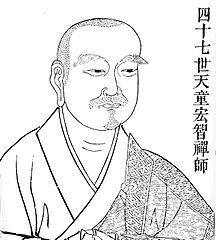Bodhidharma
Baizhang Huaihai
Caoshan Benji
Dahui Zonggao
Daman Hongren
Danxia Tianran
Dayi Daoxin
Dazhao Puji
Dazhu Huihai
Dazu Huike
Deshan Xuanjian
Dongshan Liangjie
Dōgen
Eisai
Guifeng Zongmi
Guishan Lingyou
Guizong Zhichang
Heze Shenhui
Hongzhi Zhengjue
Huangbo Xiyun
Huanglong Huinan
Huineng
Jinshan tanying
Linji Yixuan
Longtan Chongxin
Luohan Guichen
Mazu Daoyi
Nanquan Puyuan
Nanta Guangyong
Nanyang Huizhong
Nanyue Huairang
Niutou Farong
Qingliang Wenyi
Qingyuan Xingsi
Sengcan
Shishuang Chuyuan
Shitou Xiqian
Tianhuang Daowu
Xiangyan Zhixian
Xitang Zhizang
Xuansha Shibei
Xuedou Chongxian
Xuefeng Yicun
Yangqi Fanghui
Yangshan Huiji
Yantou Quanhuo
Yaoshan Weiyan
Yongjia Xuanjue
Yongming Yanshou
Yunmen Wenyan
Yunyan Tansheng
Yuquan Shenxiu
Zhaozhou Congshen
Index
Hongzhi Zhengjue

born
1091
died
1157
ACHV
Proponent of silent illumination chan
religion
Chan
POSTH name
Chan Master Hongzhi
teacher
Danxia Zichun
works
The Extensive Record of Zen Master Hongzhi
Contents
Life
Texts
Life
According to the account given in Taigen Dan Leighton's Cultivating the Empty Field, Hongzhi was born to a family named Li in Xizhou, present-day Shanxi province. He left home at the age of eleven to become a monk, studying under Caodong master Kumu Facheng (枯木法成), among others, including Yuanwu Keqin, author of the famous kōan collection, the Blue Cliff Record.
In 1129, Hongzhi began teaching at the Jingde monastery on Mount Tiantong, where he remained for nearly thirty years, until shortly before his death in 1157, when he ventured down the mountain to bid farewell to his supporters.
Texts
The main text associated with Hongzhi is a collection of one hundred of his kōans called the Book of Equanimity (Chinese: 從容録; pinyin: Cóngróng Lù; Japanese: 従容録; rōmaji: Shōyōroku). This book was compiled after his death by Wansong Xingxiu (1166–1246) at the urging of the Khitan statesman Yelü Chucai (1190–1244), and first published in 1224, with commentaries by Wansong. This book is regarded as one of the key texts of the Caodong school of Zen Buddhism. A collection of Hongzhi's philosophical texts has also been translated by Leighton.
Hongzhi is often referred to as an exponent of Silent Illumination Chan (Mokushō Zen (黙照禅) in Japanese).
Aside from his own teacher, Eihei Dōgen—the founder of the Sōtō school of Zen in Japan—quotes Hongzhi in his work more than any other Zen figure.
Contact us
Disclaimer
Comments
© Copyright Jumpypixels.com